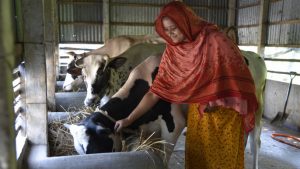The co-op is willing to continue supplying raw milk to Goodman Fielder for the domestic market but strongly opposes the requirement to supply competitors, who use the subsidised milk to compete with the co-op in global markets.
Fonterra chairman John Monaghan says he could not see how changes announced last week to the Dairy Industry Restructuring Act 2001 (DIRA) would benefit New Zealand.
“We are happy to supply raw milk to Goodman Fielder for domestic consumption.
“However, with significant increase in competition I can’t see how supplying our raw milk effectively at cost price to our competitors will benefit us and NZ.”
The Government has agreed to remove the requirement for Fonterra to supply regulated milk to independent processors that have their own supply of 30 million litres or more in a single season.
Monaghan says the playing field is still tipped against NZ dairy farmers.
“Our farmer owned cooperative wants an industry that promotes investment across regional NZ and where profits are kept in NZ. We stand for an industry where NZ farmers are paid well for their milk and where the unique attributes of our environment are protected and enhanced.
“Given the significant increase in competition within the NZ dairy industry, we’re disappointed the Government did not recommend removing altogether the requirement for us to supply our farmers’ milk to large, export focused businesses.”
The co-op is also disappointed that its third preference on the contentious open entry provisions of the dairy industry regulations was accepted by the Government. Monaghan says Fonterra preferred the open entry provisions were removed from the Dairy Industry Restructuring Act 2001 (DIRA).
However, Monaghan welcomed the decision to give Fonterra the right to refuse membership to non-compliant farmers and new dairy conversions.
“These changes will support our co-op’s ability to meet our customers’ demands and continue leading the industry toward a sustainable future for our farmers and the rural communities in which they live and farm.”
Fonterra Shareholders Council chairman Duncan Coull says farmers were “feeling ignored and frustrated” by the changes.
“This was an opportunity to focus on the wider industry, not just Fonterra, and to optimise value creation for NZ from the dairy sector,” he says.
“We are concerned that the opportunity to shift DIRA’s purpose to the future and to enable the highest value creation from our milk hasn’t been fully taken up.
“The proposed changes to open entry and exit, whilst helpful, do little to address the concerns of our farmers.”
Federated Farmers described the DIRA changes as “useful changes and a missed opportunity”.
“We’re disappointed that open entry provisions won’t be changed, other than relating to new conversions,” Feds dairy industry group chair Chris Lewis says.
“It’s nearly 20 years since this legislation was passed to ensure that with the formation of Fonterra, competition for farmer milk supply and dairy product choice for consumers were preserved.
“The market is now mature enough, and competition among a host of processing companies robust enough, for Fonterra to be given some discretion over who it is required to pick up milk from.”
Need for transparency
Fonterra says it will ask the Government to clarify its proposal to appoint a representative on the milk price panel.
Fonterra chairman John Monaghan says the milk price panel membership wasn’t part of the DIRA review and he noted the proposal with interest.
He says Fonterra encourages the Government to extend this transparency by requiring all processors to publish the average price they pay to farmers, the key parameters of their milk price and examples showing the payout that would be received given different parameters.
“All efforts to bring greater pricing transparency into the dairy industry should be encouraged. There’s no downside in farmers having clear, consistent information by which to compare processors.”
Fonterra Shareholders Council chairman Duncan Coull says changes to the milk price regime are of deep concern.
“The Government having the right to nominate a member to the milk price panel is a step too far and gives rise to a direct conflict with the independent oversight of the regime by the Commerce Commission.”













